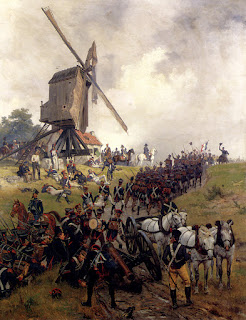In this, the third of four books covering the Waterloo campaign from the French perspective, the focus is, as the title makes clear, on Marshal Grouchy, the newest and last of Napoleon's commanders to be raised to that position, and the skirmishes and two bigger battles he fought on Napoleon's right wing, during the Hundred Days campaign.
Inevitably there's also coverage of the other concurrent events, meaning some duplication of information with other titles in the series. But this is both inevitable, and indeed necessary, and for those sufficiently interested, more pleasure than chore.
Ligny, by Theodore Yung.
In my recent review of Hussey's two-volume history of this campaign I described Grouchy thus, 'until he learned of Napoleon's decisive defeat he was vacillating and cautious, most likely too in awe of his imperial master to act decisively on his own initiative. And yet once he knew France was militarily beaten, he suddenly rediscovered his leadership mojo'... And whilst I now have a much deeper, and more nuanced understanding of his actions in the campaign, thanks to this book, I think that judgement still stands.
Grouchy.
This is a brilliant book, if, like me, you're obsessed by this colourful era, and, like me, your chief interest lies with the French. It's brilliant even if that's not the case. I've docked half a star only because Field chooses to quote a lot of the official orders and similar correspondence in full, and these are sometimes a bit verbose, and between them include a lot of repetition.
There is a reason for this, however, which is, I expect, to do with the post Waterloo blame game, with Napoleon and his acolytes saying, a la Scooby-Doo, 'if it wasn't for those darned meddling kids (Grouchy and Ney), I'd have gotten away with it!' quoting the correspondence in extenso helps clarify whether orders were understood or not, and carried out properly or not, etc. [1]
Ernest Croft's fab painting of Napoleon at Ligny.
Ultimately Grouchy did fail Napoleon, as did Ney. But then again, Napoleon was hoist by his own petard, in that he appointed them (and Soult was perhaps another unhappy choice for his particular role), and he played fast and loose with troop allocations, etc. The rickety chain of command, lack of clarity and promptitude in issuing orders, and the inherent style of Naploeon's leadership, which could cripple his subordinates ability to act well independently - this clearly happened with a Grouchy - all add up to a certain sense of inevitable failure. And that's before you even consider the bigger David vs Goliath picture, with a tired war-weary France facing a vastly superior international coalition.
All in all, another excellent chapter in Field's essential contribution to the English language literature on this epoch ending campaign, bringing much needed balance by looking at the French side of the story. [2]
----------
NOTES:
[1] The lack of clarity in some of the orders beggars belief.
[2] I do hope more of his sources become available in English, in particular the more colourful lower echelon accounts, such as that by grognard Sergeant Maudit.
----------
NOTES:
The younger Grouchy, as a Capt. Of Dragoons, circa 1792.
[1] The lack of clarity in some of the orders beggars belief.
[2] I do hope more of his sources become available in English, in particular the more colourful lower echelon accounts, such as that by grognard Sergeant Maudit.






No comments:
Post a Comment